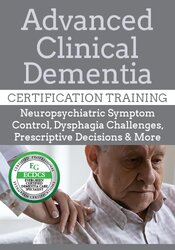

Caring for older adults with dementia requires compassion, along with clinical expertise to ensure safety, dignity, and quality of life. Many healthcare professionals struggle to manage the complex needs of dementia patients, especially when it comes to medication management and symptom control.
This one day intensive training program will empower you with essential tools to differentiate dementia types, conduct cognitive assessments, and develop effective care plans, both pharmacologic and non-pharmacologic. By the end, you’ll not only feel confident in managing dementia care but will also earn your Evergreen Certified Dementia Care Specialist (ECDCS) certification.
CERTIFICATION MADE SIMPLE!
Attendees will receive documentation of ECDCS designation from Evergreen Certifications 4 to 6 weeks following the program. *Professional standards apply. Visit evergreencertifications.com/ecdcs for professional requirements
Earn up to 6.0 CE hours. Please see below, for more details, as credit amounts vary by state and profession.
We anticipate offering up to 6.0 hours for nurse practitioners, nurses, physician assistants, and physicians. Please check back for updated credit information after the record date.
Continuing education credit information is coming soon for this non-interactive self-study package.
CE hours may be available for select professions, as listed in the target audience. Hours will be dependent on the actual recording time. Please check with your state licensing board or organization for specific requirements.
There may be an additional fee for CE certificates. Please contact our Customer Service at 1-800-844-8260 for more details.
**Materials that are included in this course may include interventions and modalities that are beyond the authorized practice of your profession. As a licensed professional, you are responsible for reviewing the scope of practice, including activities that are defined in law as beyond the boundaries of practice in accordance with and in compliance with your professions standards.

Amy Siple, APRN, has been working as a nurse practitioner, serving the primary care needs in long-term care for over 25 years. Amy has been appointed by three Kansas Governors to serve on boards and task forces to represent the needs of older adults and serves as chair of the Kansas Board for Adult Care Home Executives. Amy is a TEDx speaker, a sought-after national presenter on a variety of geriatric topics, and a content expert for Project Echo, delivering best practice updates to rural and underserved communities.
Under her leadership as president of the Kansas Advanced Practice Nurses Association, Kansas became the 26th state to pass full practice authority for APRNs. She was given the AANP state award for excellence in 2023 and the Healthcare Hero Award by the Wichita Business Journal in 2024. Additionally, Amy is a certified John Maxwell leadership speaker, coach, and trainer. Her most recent article The ABCD Approach for Managing Neuropsychiatric Symptoms of Dementia was published in the August 2023 issue of Nursing.
Speaker Disclosures:
Financial: Amy Siple has an employment relationship with Wichita Medical Associates. She receives a speaking honorarium and recording royalties from PESI, Inc. She has no relevant financial relationships with ineligible organizations.
Non-financial: Amy Siple is a member of the American Academy of Nurse Practitioners and the Geriatric Advanced Practice Nurses Association.
Access never expires for this product.
Visit our FAQ page at www.pesi.com/faq or contact us at www.pesi.com/info
Satisfaction Guarantee
Your satisfaction is our goal and our guarantee. Concerns should be addressed to: PO Box 1000, Eau Claire, WI 54702-1000 or call 1-800-844-8260.
ADA Needs
We would be happy to accommodate your ADA needs; please call our Customer Service Department for more information at 1-800-844-8260.
PESI Mobile App
Access CE trainings on your phone or tablet through our free mobile app. Choose video or audio-only versions of online courses from the world’s best instructors, and complete your CE requirements anywhere, anytime, at your own pace.
Please wait ...